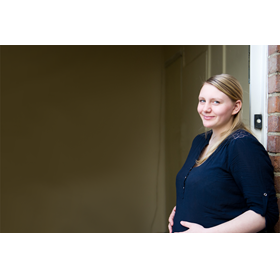ADAPT: Maternal Mental Health
We’re working with 11 FNP sites from around the country and Dartington Service Design Lab to co-design a number of adaptations to the FNP programme which we will put through rapid-cycle testing over the next year. The ADAPT project (Accelerated Design and Rapid Programme Testing), is part of the wider FNP Next Steps programme.
In the seventh of our clinical adaptations blog series, Caroline Wragg, Supervisor of the Nottingham team, outlines the adaptation they’re developing. Their focus is on addressing and better supporting Maternal Mental Health (MMH) needs.
Clinical adaptation development and aims
MMH is an identified priority for Nottingham City, and we have noticed increasing mental health needs and levels of anxiety in our clients. We wanted to develop a new approach to tackling these issues so chose to focus our clinical adaptation on highlighting and supporting improved MMH and related issues for FNP clients.
Our adaptation tests the use of the Edinburgh Postnatal Depression Scale (EPDS), an assessment tool to help identify and discuss post-natal depression (PND), alongside the Generalised Anxiety Disorder (GAD) 7, a tool for identifying and exploring anxiety, in place of the Hospital Anxiety and Depression Scale (HADS) assessment tool currently used across the FNP programme. The new tools include an additional assessment point when the child is four to five months old, which determines the level of intervention the client will receive. A repeat assessment at the end of the intervention period aims to track any improvement in their mental health or indicate additional support required.
We have also developed a new targeted MMH toolkit which family nurses can use to directly address issues relating to a client’s emotional health and wellbeing. The toolkit offers multiple resources to help the client:
- Understand her emotional/mental health
- Identify appropriate self-help and coping strategies
- Improve how she interacts with her child.
Working with clients
Clients were involved in the design of our adaptation from the outset, and their input and opinions really helped shape its development. We presented resources, facilitators and apps, based on evidence from experts and NICE guidance. Clients were asked to share their thoughts on the suitability of the materials and discuss what other forms of support they would like or might find useful. They were incredibly open in discussing how they felt about their mental health experiences, and almost all of them wanted to understand more about mental health generally and how common mental health issues can be at the time of pregnancy and within the first year of having a child.
There was also a consensus around the fear they felt in telling someone about their mental health; worrying that people would judge them as a bad parent, which might, in turn, increase the risk of their child being removed by children’s services. All of the clients felt the best person to share their concerns with and get support from would be their family nurse.
Based on our clients’ feedback, we identified a number of keys areas that we want to address:
- The need for clients to have a better understanding of their mental health or anxiety issues and how it might impact on themselves, their relationships and their child’s development and emotional health
- The need to provide clients with a number of ideas for coping strategies, so that they could find something practical to help them through difficult times. This included knowing where to go or how to get help
- The need for a strong focus on mum and baby connectedness.
What we hope to achieve
This adaptation uses many elements of the current FNP programme, together with some useful additions, and lends itself well to the personalisation strand of ADAPT. The targeted offer toolkit enables the family nurse to flex the programme, offering intensive support around MMH when the client needs it most. We hope that the delivery of the adaptation will, over time, support the refinement of effective tools to address MMH issues promptly, offering the earliest possible interventions and preventing escalation to specialist services.
Some of the new facilitators may sit well as core materials, offering all clients an insight and reassurance around MMH, anxiety issues and breaking down fear of sharing concerns. Further development of the targeted toolkit could provide all family nurses with a variety of resources to help facilitate interventions with clients that are experiencing mild to moderate levels of anxiety and PND. The toolkit will also provide support while clients are awaiting interventions from specialist services.
As a whole, the process has increased the awareness and knowledge of the team around all aspects of MMH and highlighted the significance of offering the right level of support to address this. Additional training and consultation with clients has increased nurses confidence to address emotional health issues, which we hope will lead to improved outcomes for mums – increasing coping strategies, improved attachment and increased social and emotional health for their babies.
